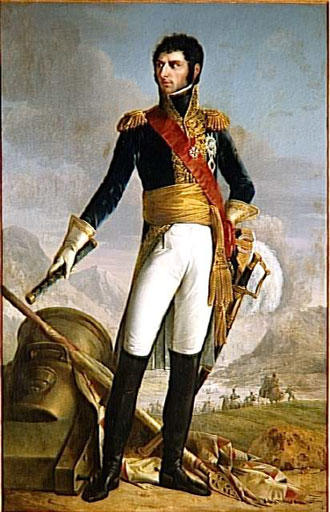The directory «Plots of stamps in the catalogue»
Bernadotte Jean-Baptiste
(1763—1844)

One of the most controversial of Napoleon Bonaparte's marshals, Jean-Baptiste Bernadotte was a committed republican whose career, mainly a self-serving one, can be divided into three stages. The first was his rise through the ranks of the French army from 1780 to 1794 and saw him go from enlisted man to general of division. Along the way he fought, mainly along the Rhine, and won a victory at Limburg in 1796. Two years later he was sacked for quitting his command due to dissatisfaction with how the war against the Second Coalition was being fought, but had the good fortune to marry Desiree Clary. The second period of Bernadotte's career started well, he performed well at Austerlitz and earned his princedom, but his military star was on the wane and in 1807 he again faced dismissal. The reason was his poor efforts at Jena and Auerstadt, where he did not help the much outnumbered Marshal Davout at Auerstadt, nor did he lead his troops to Jena where Bonaparte was fighting. Two things probably saved him. The first being Davout pulling off one of the great military victories and the second being Bernadotte's wife, Desiree Clary, was a former lover of Bonaparte. Smarting from the dressing down he got from Bonaparte, Bernadotte successfully chased General Blucher's Prussians and forced the fierce warrior to surrender at Lubeck. Seemingly with a renewed taste for action he won clashes at Mohrungen, Spanden and Linz but again failed when he erred at Wagram and was sacked by the emperor. This led to his third and most successful time - as the newly elected Crown Prince of Sweden! Adopted by the childless Charles XIII, Bernadotte took his new country to heart and put his talents to excellent use. Initially amicable with Bonaparte, things became strained when France occupied Swedish Pomerania in 1812. By 1813, Bernadotte joined the Sixth Coalition against his former emperor and beat two former comrades in arms - marshals Oudinot and Ney at Gross Beeren and Dennewitz. He then added his Swedish troops to the Allied mix at Leipzig earning political points with Bonaparte's eventual conquerors. In 1814 he incorporated Norway into Sweden. In 1818, Bernadotte became King Charles XIV of Sweden and, while regarded as a traitor by the French, began a long new royal dynasty that is still in existence today.
Gabon, 1969, Oath of the Army
Guyana, 1993, Coronation of Napoleon
Norway, 2013, Statue of Swedish Norwegian king Karl Johan III
Ras al-Khaima, 1970, Coronation of Napoleon
Sweden, 1973, Charles XVI John
Sweden, 1994, Charles XVI John
Sweden, 1999, Charles XVI John riksdaler